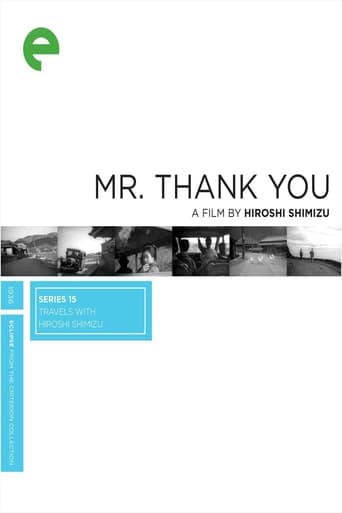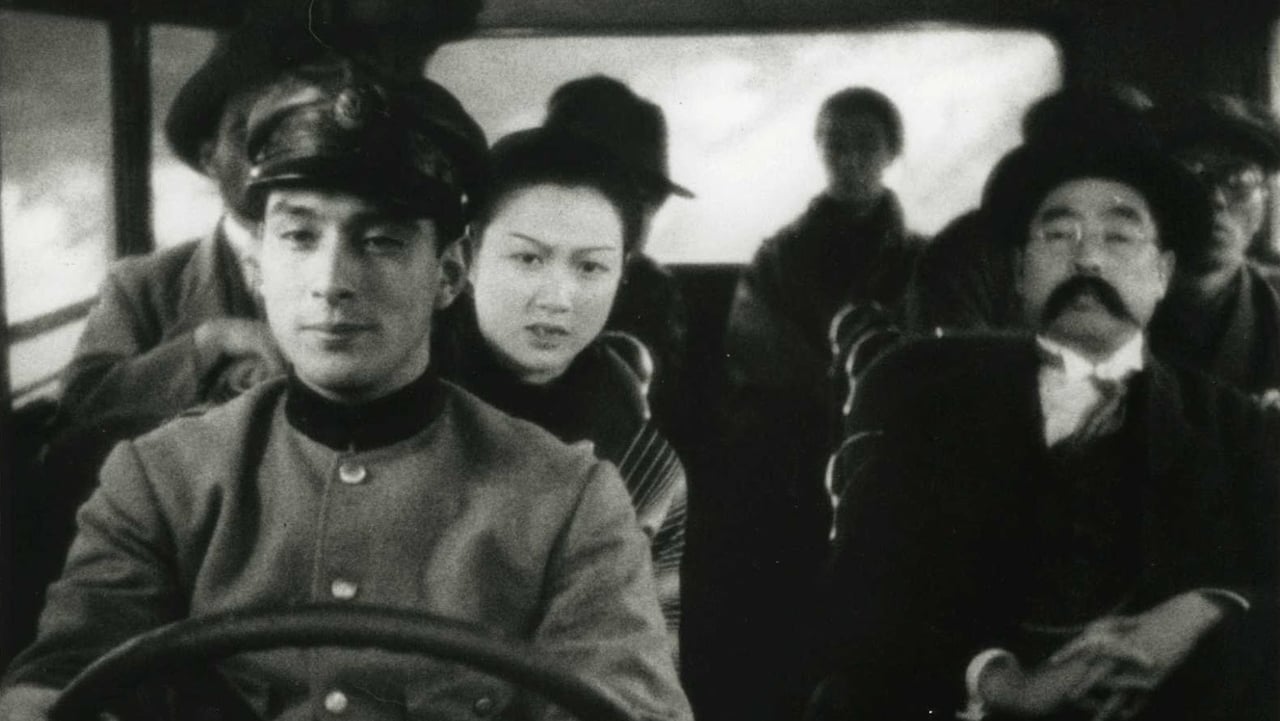parkergirl
This was the first movie of Shimizu Hiroshi I have watched and it left a good impression on me. The story seemed simple, but the scenes were well-executed. The film offers the viewer the chance to hop on Mr. Thank You's bus and drive through Japan's breath-taking countryside while listening to stories of people from all walks of life. It was very interesting to see how Japan looked like in the 1930s as well, far from how it looks like in modern times. All in all, a simple, lighthearted film that I would want to re-watch from time to time.
WILLIAM FLANIGAN
Viewed on DVD. Poor restoration. A film you don't want to end! This is a charming, engaging, and ultimately mesmerizing gem from director's Hiroshi Shimizu's canon. The title is the name given by the locals to a uniformed (right down to the traditional white gloves), exceeding polite, and exceptionally considerate driver of a small bus that connects country folks with the outside world. "Thank you" is a salutation the driver never fails to use when walkers allow his bus to pass on narrow dirt roads. They typically respond with "Thank You Mr."). It's only a dozen or two miles that are traveled, but a lot can (and does) happen during this particular trip. A time capsule of rural Japan in the midst of the Great Depression (circa 1936) and the director's conception of its inhabitants. The driver is quite sharp looking in his uniform, has the eye of all the women (both off and on the bus), and is a humanitarian and psychologist as well as a competent wheels man. Comedy (there are some hilarious one-liners not lost in the subtitles), poignancy, sadness, optimism/hopefulness, and a myriad of other emotional facets are provided by a group of talented (and engaging) character actors. It's remarkable how quickly the viewer is empathetically pulled into the characters' slices of lives without fully realizing it. The hallmark of a great story teller! Interestingly, no one seems to pay for a bus ride. Sound is sub par and artificial even by contemporary standards--the film seems to have been shot silently and later end-to-end dubbed (not unusual during the very early talkie days ((circa 1930)), but since abandoned in most of the West). The picture is relentlessly fuzzy which may be the result of having to use inferior film stock and/or a primitive printing process. But Shimizu rises above the marginal quality of the cinematic tools at his disposal to get his stories across! As for the restoration, it seems to have removed wear and tear as well as reel change-over artifacts, but should have worked A LOT HARDER at clarifying the image digitally. WILLIAM FLANIGAN, PhD.
Tryavna
Like Sadao Yamanaka and Mikio Naruse, Hiroshi Shimizu is one of the major Japanese directors whose work has been overshadowed in the West by the popularity of Mizoguchi, Ozu, and Kurosawa, even though his films are every bit as good as theirs. Whereas Naruse's reputation has benefited in recent years from several DVD releases in the U.S. and U.K., however, Shimizu's films are still relatively hard to track down. The release of four of his films by Criterion's Eclipse label helps, but at least four more films have already been released on DVD in Japan and deserve distribution in the West."Mr. Thank-You," as this film is known in the West, is a perfect introduction to Shimizu's work. Like Ozu's films, it is bittersweet in tone, though with perhaps a little more emphasis placed on humor than on pathos. But Shimizu's camera is far more mobile than Ozu's, so stylistically, it has a bit more in common with Naruse. The other two reviewers have already summarized what little plot there is: the film is basically a "road" movie, in which an assortment of middle-class and working-class characters travel from a rural community to Tokyo. As the film progresses, each character's personality reveals itself, and a small, short-lived sense of community develops. Whether or not that sense of community will continue after the film ends (due to a budding romance between the bus driver and a young female passenger who is being sold into prostitution because of family debt) is pretty much the only source of suspense or plot. Nevertheless, as a slice of life, "Mr. Thank-You" is nothing short of magnificent. Shimizu's humanism is evident in every frame of the film, with each character, including the bit parts, emerging as three-dimensional people with very real concerns and aspirations. This is a film you watch for the character development and for the loving treatment the director, writer, and actors give them.As a side-note, Shimizu's importance as a voice of dissent during Japan's militarization and as a link between pre- and post-war Japanese cinema is apparent in the short interlude between the bus driver and a female laborer he offers to give a free lift. The female laborer is Korean, and Koreans were perhaps the most marginalized people in 1930s Japan -- their country having been colonized by Japan and their people reduced to ill-paid, migratory labor. Giving such sweet and tender treatment to this character's plight gives some indication of Shimizu's true feelings toward Japan's imperial expansion and reveals that there's a lot more going on in this film than might first seem.
zetes
Nice little Japanese comedy. Mr. Thank You is a bus driver who often brings people from the country to Tokyo. As he drives along the narrow dirt roads, he profusely thanks the farmers and such who move to the side as he passes them. At one village, he picks up a 17 year old girl and her mother. The girl is being transported to Tokyo, where her mother will sell her into prostitution. It's the Great Depression, and the family can no longer afford to support her. Over the course of the trip, Mr. Thank You becomes more and more aware of the girl's sad face. The rest of the bus chat amongst themselves, drink, smoke, whatever. The film runs about 80 minutes, and, honestly, is pretty slight. The titular character and the young girl are rather dull people. A couple of the other passengers are more interesting, but they also are generic types of people (e.g., modern woman or stuffy businessman). It's funny much of the time, and well filmed. I like seeing the Japanese countryside and its people. Japanese films of every era focus way too much on just Tokyo that it's easy to forget the rest of the country.


 AD
AD
